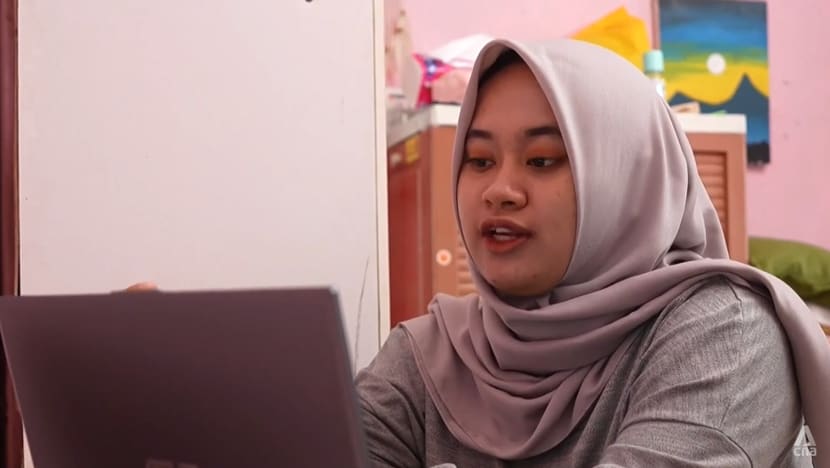Mismatch between skills and market demands keeping millions of young Indonesians out of work
With the intense competition for jobs in Indonesia, observers highlight on CNA’s Money Mind programme that it is not uncommon to see thousands of applicants for a single role.


This audio is generated by an AI tool.
SUKABUMI, Indonesia: Indonesian youth Icha Nur Septiani sent out more than 2,000 resumes before she finally landed a job as a customer service expert at a major ride-hailing company.
But for about eight months, all the 23-year-old got was rejection after rejection.
It was not what she expected when she graduated with an electrical engineering diploma from Bandung State Polytechnic in 2023.
“I basically just applied to every job listing, as long as I met the qualifications,” she told CNA’s Money Mind programme.
Spending three to four hours daily to browse job vacancies on her laptop became the norm for her. She set a target of making 20 to 30 applications a day through various job platforms.
“If I sent out around 15 to 20 applications in a day, I would receive around 10 to 12 rejections, either through WhatsApp, email or directly on the job platform,” she said.

INTENSE COMPETITION FOR JOBS
But Icha’s struggles are not uncommon among jobseekers in Indonesia.
There is intense competition for jobs, and young people are the worst affected, said observers.
An estimated 9.9 million Gen Zs are unemployed in Indonesia.
The unemployment rate among those aged 15 to 24 is over 17 per cent - much higher than the national unemployment rate of 4.9 per cent.
Experts told Money Mind that it is not surprising to see thousands of applicants for a single role.
Economist Telisa Aulia Falianty, a senior lecturer at the University of Indonesia’s faculty of economics and business, said the current job market is very competitive.
“In my generation, for example, educated people were still rare,” she added.
“If we wanted to work in sectors (requiring higher education), it was relatively easy. If we had access to education, it was relatively easy to get. But now, everything is more competitive.”
For Icha, she even applied for positions outside her field to boost her chances of getting a job. Still, no offers came.
“Was it me? Was there really something wrong that I didn’t know about?” wondered Icha, who lives in Sukabumi in Indonesia's West Java province.
“I also felt embarrassed in front of my family … I hated having to ask for money, especially for interviews out of town, only to fail again and again. That really made me feel pressured and like a total failure.
“I kept asking myself, ‘What’s actually wrong with me?’”

GOVERNMENT POINTS TO DISCONNECT
The Indonesian government has said that there is a disconnect between the jobs Gen Z applicants want and the skills the economy needs.
“We have economic growth, but the younger generation cannot really optimise or use the benefit of our economic growth translated into employment creation for them,” said the University of Indonesia’s Telisa of the differing expectations.
“There is some mismatch between the economic growth sectors — the ones that create employment — and the demand or preference of Gen Z when it comes to work.”
She added that countries with a large population and a higher population density usually face problems with youth unemployment.
The government is addressing these issues by focusing on science, technology, engineering and mathematics (STEM) subjects, and improving vocational education.
But such efforts will take time to bear fruit, said observers.
“We know that Indonesia is still lacking digital talent,” said Telisa.
“So actually, the average skill of Gen Z and millennials is good in terms of technology, but only as users. But for work, they should have more complicated skills and more advanced skills to develop.”
BECOMING MORE EMPLOYABLE
Experts urged young Indonesians to enhance their skills to stand out in a crowded job market.
For Icha, she took up more certifications to make her employable in areas like data analytics.
Career coach Teddy Diego, who worked with Icha to improve her resume after she failed to secure a job, advised jobseekers to also focus on relevance when applying for a job, instead of listing all the achievements they have.
When asked how he guides jobseekers in their job search, he said: “I focus on what companies in Indonesia are actually looking for, whether it’s administrative requirements, specific skills, or how to successfully go through the recruitment process.
“Information on these aspects isn’t always clearly or effectively communicated by companies. That’s why I try to fill that gap by providing guidance and insights to jobseekers.”
On Icha, he noted that she possesses strong job competencies.
“Her experience, her willingness to learn, her involvement in various organisations, and all the certifications she’s taken really show that,” he added.
“The issue was more about how she presented all of that in her resume, and also how she presented herself during interviews.”
While her current customer service role is not linked to her diploma, Icha earns up to 5 million rupiah (US$300) monthly. This is above the national average of 3.27 million rupiah a month.
“Even though technically it might not align with my major, it fits with the soft skills,” she said.
“(This includes) the problem-solving skills I use every day to handle drivers' complaints, how I adapt, and also communicating with other teams.”
Icha still hopes to earn her bachelor’s degree one day, a step toward achieving her dream of becoming an engineer.
“If I look at my friends, maybe most want a job in an air-conditioned room, something not too physically demanding,” she said.
“But for me, I want to work wearing a wearpack (protective clothing); I want to work with a helmet on. I want to work in the field.”

















